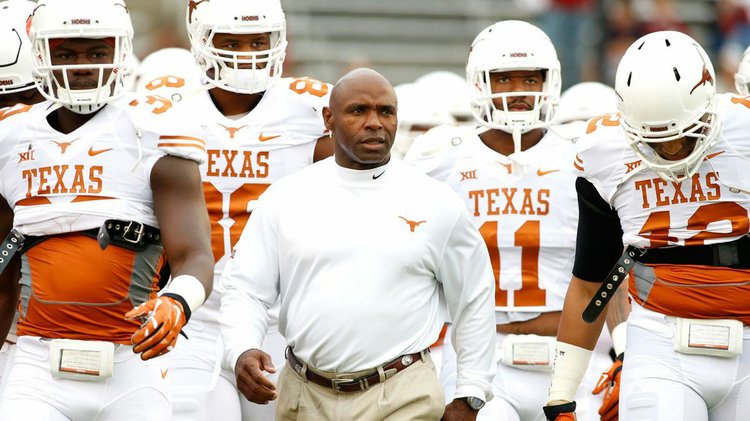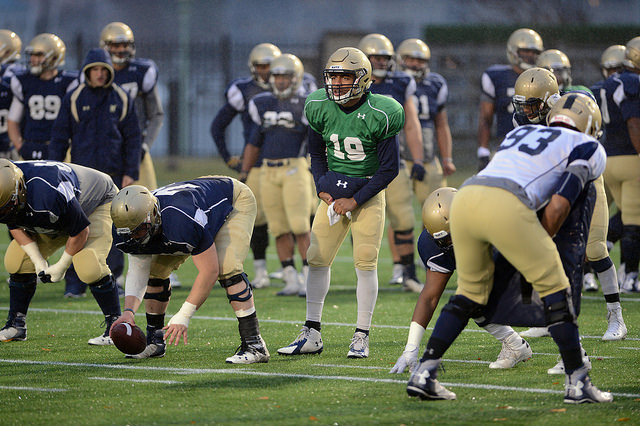Most football coaches think of and do almost everything they need to prepare for a game. They watch film, scout, prepare practice plans, and condition and lift their players. Even though all of that is in place, most programs are not thinking about the behind-the-scenes factors that can maximize their players’ performance through non-football preparations. Below are some questions that coaches should be asking that can be the difference in winning or losing.
WHAT IS THE TEMPERATURE?
Most of us have to coach in very hot games in August and if you are fortunate, you get to coach in very cold games also. The state championship in the northern states is always cold.
Adjustments for hot games:
- Delay the start of the warm-up. How long does it take to warm-up when it is 90 degrees outside? It does not take very long and remember if there is more energy expelled during warm-ups then that is going to tire the players for the end of the game.
- Do not wear any equipment until you have to. Do the dynamic warm-up, stretching, special teams, and throwing without shoulder pads and helmets. Just put the full equipment on for team periods and/or when they need to hit each other.
- At halftime, have the players take off their shoulder pads and get them in the air conditioning.
- Make sure water and Gatorade is available at all times during pregame, during the game, and at halftime.
- Have cold towels on the sideline to help keep the body temperatures down.
- You probably will not need to warm-up again for the second half. Sometimes the kids just tell me that they want to stretch because they are already warm. The athletes will not get “cold” during a 15-20 minute halftime.
- The players should wear the least amount of clothes possible underneath their pads. They do not need to wear long sleeves or tights.
Adjustments for cold games:
- Have your athletes wear long sleeves and leggings. I know people think it makes them tough if they do not wear sleeves but all it does is make them cold.
- Warm-up longer. It is going to take some time to get loose when it is 10 degrees outside. In one of the state semifinals, we actually jogged around the field for about 5 minutes before we even tried to start our warm-up. They were going to get nothing out of our dynamic warm-up unless we got their body temperature elevated.
- The halftime warm-up may need to be longer to raise their body temperature.
- Make sure the athletes are drinking water. It is a common mistake to think that because it is cold the players do not have to drink as much water. The body can still get dehydrated and teams still experience cramping when it is cold.
WHEN SHOULD WE EAT THE PREGAME MEAL?
10 AM game:
Since players should eat around three hours before the game, have the athletes wake up around 7 AM to eat breakfast. For the athletes that do not like to eat breakfast, they are going to need to eat something light and then make sure they drink a lot of Gatorade during the game. They also might need a halftime snack.
12 PM game:
Noon games cause the most problems because most athletes do not prepare correctly and do not realize how poorly they prepared until it is too late. For these games, athletes should wake up around 6:30 AM and eat what they can. You might think that this is way too early but athletes have to eat two meals before the game. Their bodies are used to eating breakfast and lunch and if they only eat once before this game then their bodies and minds will not function very well around 1 or 2 PM. What most athletes do is they get up too late, eat breakfast, and think they are ready to go. The problem is they have not eaten enough calories in that one meal to sustain them throughout the game and through lunch time. Once again the kids will need a lot of Gatorade and might need halftime snacks.
3 PM game:
These games are pretty easy to handle. The kids can eat around 8 AM and then eat again around noon. If it is not a school day, I would bring the athletes in around 8:30 AM for a quick walkthrough so they get up and eat, get all of their meals in, and to ensure they do not sleep all morning.
7 PM game:
The players can eat breakfast before school, lunch at their normal school time, and then eat again around 3:30/4 PM. Once again if it is not a school day, I would have an early morning walkthrough.
WHAT ARE SOME GOOD CHOICES FOR GAME-DAY MEALS?
BREAKFAST: Oatmeal, Whole Grain Toast, Eggs, Fruit
LUNCH: Chicken, Veggies, Fruit, Rice, Peanut Butter & Jelly
PREGAME MEAL: Pasta, Rice, Fruit, Veggies, Whole Grain Breads, Peanut Butter, Chicken or Fish
PREGAME SNACKS and/or HALFTIME SNACKS: Apple Sauce, Any Fruit, Nutri Grain Bars, Granola Bars, King Bars, Cliff Bars, Gatorade Chews, Anything that can get into their system quickly
POSTGAME MEAL:
- Protein to start the recovery process
- Carbohydrates to replenish what they just used and to give them energy for the next morning’s workout.
- Fruits and Vegetables to replenish nutrients and to help with recovery
- Drink a lot of water to rehydrate
WHAT SHOULD NOT BE IN THE PREGAME MEAL?
- Fatty foods (breakfast meats, fatty meats, red meat)
- Any type of dairy product (cheese, sour cream, yogurt, etc). When I first started coaching I once told the parents to make pasta for our pregame meal and the mom made the greatest tasting lasagna I ever had. The problem was the cheese made most of my players vomit in pregame warm-ups because it was 95 degrees and humid. We dodged a bullet because we played a bad team but I made sure I was more detailed after that.
- Fatty or milk based condiments (butter, ranch dressing, mayonnaise)
- Chips
- Spicy food
- Dessert
WHAT AND WHEN SHOULD ATHLETES DRINK?
Athletes have to drink water before the game. I used to buy cases of water and put them in the locker room because they would not bring their own water bottles. The rule would be for them to drink a bottle, fill it, and drink it before game time. I would go around the locker room and make sure they had their water bottle for walkthroughs and when we got on the bus.
The hard part about players cramping is once they start it is almost impossible to stop. Cramping players go to the sideline, get stretched, and drink fluids. It is frustrating to watch everyone clap as they hobble off the field because they are unprepared, not injured. They seem better for about 5 minutes until they do something explosive and then they cramp again. It is a vicious cycle so players have to be proactive.
During the game, athletes should drink water and Gatorade or some kind of electrolyte drink. When it is very hot they need to drink water even if they are not thirsty. If you buy Gatorade, buy the original so the athletes get the sugar they need. There are also packets of electrolytes like Liquid I.V. that they can put into their water bottles.
One of my former athletes now plays in the NFL and he told me that many of the athletes drink about a half of a cup of regular coffee before the game to give them a slight boost. Almost every dietician will say that caffeine is the best legal performance enhancement. Remember though that more coffee is not better because it will make them jittery and coffee is a diuretic. Before a game, athletes should not drink soda, milk, or energy drinks.
PREPARING FOR RAIN DELAYS?
This is a hard one because nobody thinks about this until it happens. It is important because it might be the difference in winning or not. If there is a 7 PM game and the kids have eaten around 4 and then you have a delay that causes the game to not end until 11 PM or midnight, the players’ minds and bodies are going to be starved and will cause them to cramp and to make more mistakes.
This just happened to me this week. I am the strength coach for the Midland Redskins Baseball Organization and we were at the AABC 18U World Series when a lightning delay occurred. I went to the concession stand and bought every “Uncrustable” they had so my players had something to eat. I was lucky that the concession stand had a good option because I was not prepared. It is hard to plan for these delays because they hardly ever happen so you will seem crazy to constantly worry about them. Designate a coach or parent to bring food or know that they might need to go get food if the delay is long. As coaches, we have to deal with every worst-case scenario.
SHOULD I ALLOW MY PLAYERS TO GO HOME BETWEEN SCHOOL AND THE GAME?
This is a hard question to answer because there are so many variables. If your team is responsible and you can count on them to not get in trouble and get back to school on time, then I would let the players go home. My players have consistently told me that they like to get away from school, go home and nap, eat something they like, play video games, not have to bring all of their football gear to school, and just decompress for a little while. The coaches also need some time to decompress before the game.
If your team is irresponsible and cannot get back to school on time, then it might be a good idea to keep them after school. I once coached a team where we found out that many of our players were doing drugs between going home and coming back. Our players were making a lot of mental mistakes, were cramping a lot, and were struggling with effort. Once we realized this, we started keeping them after school and those problems went away. Even though this worked, the logistics of keeping them after school was daunting. We had to organize food and then give the kids what they wanted and needed. We had video game rooms, movie rooms, and napping rooms. The process worked but it was tiring for our coaches because we had to monitor each of the rooms. If we had a long-distance road game, the day was much easier because there was just less time that we had to entertain the athletes.
WHERE DO I GET GOOD NUTRITION INFORMATION?
I am not a dietician but I have been collecting information from a variety of people who are. There is a lot of good information in the following document: Nutrition Information
For more detailed and tailored programs, I send all of my clients to a dietician named Geoff Borro (pronounced Jeff Borrow). His email address is gborro@gmail.com. Geoff is extremely affordable, can do all of your consultations over Skype, and can write excellent programs for gaining, maintaining, or losing weight. He is excellent at his job and much smarter than I am.
If you are interested in learning more you can go to the resources page on my website (https://exceleratead.com/training-theory) to find my FREE and moderately priced CoachTube Courses, Coaches Choice Videos, and a variety of other training articles and resources. My contact information is on my website so please feel free to email me with any questions.



